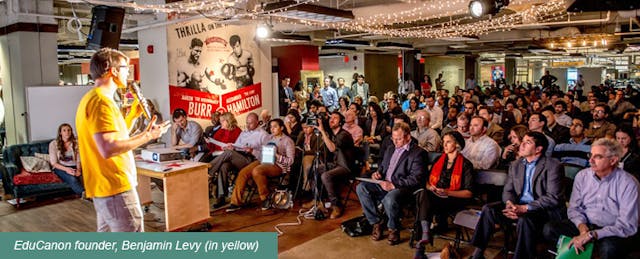Bring out the broom. EduCanon, a tool that lets users build lessons with interactive timed questions and videos, took first place in the 1776 Challenge Cup’s education category for a $100,000 investment prize. Then it won another $15,000 in cash as part of the McGraw-Hill Education Prize for Open Educational Resources at the 2014 Milken-Penn Graduate School of Education Business Competition.
Running back and forth between Washington, DC (with a brief White House stop) and Philadelphia made for a whirlwind week for EduCanon team. But co-founders Benjamin Levy and Swaroop Raju took it all in stride.
Levy created EduCanon during spring break of his last year as a middle school science teacher for Teach for America in 2012. “I had 28 kids in a class with diverse learning needs,” shares Levy, “and I used EduCanon as a way to differentiate the experience for my students.” That fall, he enrolled in MIT’s Sloan School of Management program, where Levy focused on entrepreneurship and web development.
But his student days were short-lived: In the winter, EduCanon was accepted into Boston-based edtech accelerator, LearnLaunchX. Levy took a leave of absence to focus on building the company. Along with Raju, the duo officially launched the product in September 2013.
“Though we talk flipped [classrooms] a lot, the root of EduCanon was a blended learning tool,” explains Levy. Early EduCanon adopters are using the tool to flip their classrooms by embedding commentary and checks for understanding directly into videos. While most of the 20,000 current users are high school teachers, the startup is seeing some traction among those in elementary and middle schools as well, thanks to a partnership with Edmodo. Next year the EduCanon team plans to release an enterprise version of its platform for corporate training and higher education.
The schoolhouse is not the only place where EduCanon is picking up some steam: The 2014 Special Olympics organization is currently using the platform to credential their volunteers.
Bracketology
The 1776 Challenge Cup, sponsored by DC-based tech accelerator 1776 and Pearson, is modeled after college basketball’s “March Madness,” with startups around the world competing in “brackets.” Beginning last October, 350 out of the 5,000 startups who applied worldwide were selected to compete in 16 regional contests. Local judges reviewed a detailed application from the startups before meeting them for a brief one-minute pitch in front of an audience, after which the judges made their decision. Each region had one winner for each of the four competition categories: education, energy, health and smart cities.
The 64 finalists then descended on Washington, DC on May 9 for an all-expenses-paid week of competitions and events. The sixteen education startups chosen to compete in the Final Championship Cup in D.C. were split evenly between those from the U.S. and overseas.
On May 12, the day of the education competition, the judges spent approximately 10 minutes with each startup privately to get a walkthrough demo of the product. Then, in front of an audience of several hundred people, each startup shared more about their traction and business model for about five minutes, after which they did a three-minute Q&A with the judges. The companies were rated on their ability to deliver a high quality education while reducing costs, as well as increasing access, quality and skills suitable to the demands of a 21st century workplace.
By May 17, the field of 64 finalists was narrowed down to the “Elite Eight”--one U.S. and one international company for each of the four categories. EduCanon beat out Tel Aviv-based Lingua.ly, a language learning tool, to win first place in the education category. (Lingual.ly still received a tidy $50K investment from 1776.)
In the “Final Four,” EduCanon went up against the winner of the Smart Cities category, HandsUp, which developed an app that allows people to contribute directly to homeless in the neighborhood. HandsUp won and ultimately took home the top honor as the “Overall Challenge Cup Winner,” which comes with $150K in investment funding. (Investment terms were not disclosed.)
As EduCanon’s fame, user base and wallet grows, so does its desire for a bigger home. The team is currently working out of a garage in Galesburg, MD (population: 600), but is now looking to upgrade its office. Any takers?


